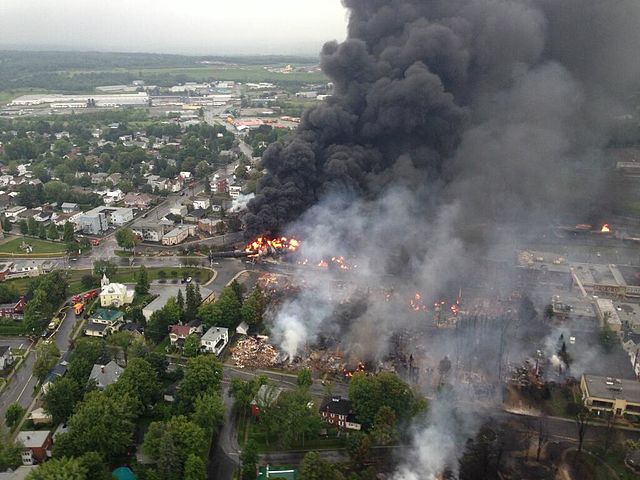There is an important public policy backdrop to the disaster that befell the good people in Lac-Mégantic, Quebec in July, when a freight train — with five locomotives and 72 tanker cars — jumped the tracks. The crude oil leaked and then exploded, killing at least 47 people, destroying much of the town, and contaminating the soil and a nearby lake.
The core responsibility of government is to protect its citizens from harm when at all possible. The question here is whether Ottawa has met its responsibility to safely regulate railway transportation. I was surprised to learn, for example, that there was but one engineer for the train. That driver had reached the limit of how many hours he could drive on that day and he left the train, unattended, on the tracks uphill from Lac Megantic while he went to a hotel to rest. In his absence, there was no one else attending the train.
Transport Canada allowed Montreal, Maine and Atlantic Railway Inc. to operate in this way. The company, preposterously, has defended the one-engineer practice, saying that it is safer to have only one driver because that creates fewer distractions. I must say that I have always felt safer in a jetliner with a co-pilot aboard than I would if there were but one pilot.
There is also the question of the age and design of the tanker cars. There are newer, sturdier and safer tanker cars than the ones that were being used here, but it has not been mandatory to use those newer cars to transport oil.
The government has largely removed itself from safety inspections and oversight, and turned those responsibilities over to railway companies. This is an unsound policy and an abdication of the responsibility to protect.
Behind these immediate safety concerns lie others. The death train was carrying crude oil from the Bakken field in North Dakota. That product is extracted using a process known as shale oil fracking, which many critics say inserts pollutants and carcinogens into the existing water supply.
This cargo travelled from Bakken into Canada and across the country destined for an Irving Oil Ltd. refinery in Saint John, N.B. In the past five years, the volume of crude being shipped within Canada by rail has increased exponentially, from 500 carloads in 2009 to a predicted 140,000 carloads this year. The Bakken field has no pipeline connection, and that is largely true for the oil sands in Alberta. As a result, the oil and gas industry wants more pipelines, but there are pitched debates over plans to build them.
Meanwhile, the dire reality of global warming looms. The Prime Minister has touted Canada as an “energy superpower,” and the plan is to go full speed ahead on energy development in the oil sands. If that occurs, Canada cannot hope to meet even its modest commitments to reducing the intensity of carbon-based emissions. There is much to ponder and do, and we had best get it right.
This piece appeared on line in the United Church Observer on August 8. You can read the Observer on line by clicking HERE.



